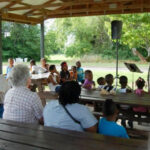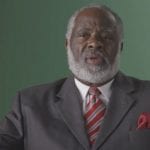When the restaurant staff saw the four young men walk in wearing masks, they knew it was a robbery. They took off running—all except the cook in the back. He was wearing earbuds and didn’t hear them come in.
The cook—Tony Smith—wasn’t even supposed to be working that night. He was planning to watch the Giants play the Rangers in the 2010 World Series with his grandma. But someone asked him to cover the shift, and he said he would.
When the would-be thieves found Tony, they took him up front and told him to unlock the cash register. It was jammed, and he couldn’t do it. So one of them—a 17-year-old high on ecstasy—fired his gun.

Tony’s father, Beeson Divinity School preaching professor Robert Smith, was at a conference in Baton Rouge, Louisiana, when he got the call that his youngest child had been shot. Forty-five minutes later he got another call—Tony was dead. He’d been killed for literally nothing—his attackers didn’t make off with so much as a penny.
“You learn to say that God is sovereign,” Smith said. “It’s easy to say that when the sun is shining, but when the sun goes down, and you have to live that, it becomes real.”
Smith has spent a lot of time in the darkness. His first wife died of lupus when their three boys were young. His oldest son battled cancer for 15 years before passing away last year. He’s experienced his own health challenges, including a stroke in 2021.
He has no idea why those things happened to him.
“We are not to demystify the mystery, or unscrew the inscrutable, or figure out the unfigureoutable,” Smith said. “We always have to go back to Calvary. God did not spare his own son. God hurt himself for us. Pilate and the soldiers all thought they were carrying out their own plans, but they weren’t.”
Holding onto God’s sovereignty, Smith forgave Tony’s killer and began writing letters to him in prison. He kept working, teaching and speaking all over the world. He read the entire Bible aloud for Crossway’s new audio version of the ESV. In a few months, he’ll retire after 27 years at Beeson.
The Gospel Coalition asked Smith about grieving, the process of forgiving Tony’s killer, and what it was like to read the entire Bible aloud in six weeks.
You’ve lost three members of your immediate family—but only Tony was killed by force. Do you grieve his loss differently?
All the losses were painful, and yet they were distinct. His mother’s death was not tragic. You could attribute it to illness. And we had time—she was sick for two and a half years. To some extent, the same is true of his brother Robert III, who was also sick. In fact, we rejoiced over him, because he lived 15 years after he received a cancer diagnosis that should have killed him in two to three years.
Tony was just 34 years old. And we had no notice—just a call.
But all of this was allowed by God. What God permits, God has a purpose for. And so we go on, and we say, “God is the owner of everything. Therefore Tony did not belong to us. Tony belongs to God. And he waits on us. And one day we will rejoin him and worship together.”
How have you seen God’s purposes in this tragedy?
I did the eulogy at Tony’s funeral, and out of that came a book called The Oasis of God: From Mourning to Morning. It’s a book I never wanted to write, but it has opened up so many doors. People across the world, where I’ve been to represent the Lord, have been drawn to me, and I’ve been drawn to them—because we’ve had similar experiences. And I’ve had an opportunity to share what God can do in the depths of grief. It has been an incredible opportunity to represent God.
You’ve even been able to represent God to the young man who shot Tony. How did that happen?
At first, I was so angry. It was so senseless.
About eight months after the murder, I was in Nairobi, Kenya, on a mission. And I felt the Lord ask me a question—not audibly, but I began to think, Do you believe in forgiveness?
Yes, I do.
Do you teach and preach on forgiveness?
Yes, I do.
I want you to forgive Tony’s murderer.
I knew forgiveness was something I would need to do, not out of duty but really out of delight. I say that only because I think that you have to get inside the heart of a person before something becomes real. I had to see the situation—remember the courtroom, see the young man handcuffed and on his way to a 15-year sentence, revisit my son’s death.
Then I thought about what Jesus went through for me. I know that I was born in sin, shaped in iniquity. I’ve committed infraction after infraction, fallen short of the glory of God.
I realized what God had done to forgive me. I lost Tony, but not willfully. God himself preordained the death of Jesus. God did that. Abraham came within a second of killing his son Isaac and God stopped the knife. But God let the knife come down on Good Friday on his own Son. He didn’t stop it.
When I think about that—oh my goodness, then it’s an experience. It’s an encounter that touches my heart. And the Spirit gives me the ability to do what I don’t want to do and what I couldn’t do. Then it becomes a delight to participate in what God has already done, which is forgiving the one who committed the infraction against me.
Did you tell the young man you forgave him?
I did. I wrote to him and told him I was praying for him, that I loved him, and that I was forgiving through him by the grace of God.
I didn’t hear from him for a good six or seven months. I wrote him twice before he finally wrote me back. He said he didn’t write me back at first because he was afraid I’d expose what he’d done to other people in prison, and maybe people who knew Tony would retaliate against him.
When he did write, he wanted to know why I continued to write him, why I would love him, and why I would forgive him. So we kept writing back and forth. He shared with me that he had come out of a Christian home. He sent pictures of his pastor, pictures of his church. I know exactly where his church was. I preached in that area. He said that night he was with the wrong people, that he was high on drugs.
Some of my relatives couldn’t understand my love and forgiveness. I was not at all saying that there are no consequences—no, there are consequences to sin and to wrongdoing. But we must forgive.
Is it hard? I say to people that forgiveness is not difficult. It isn’t. It’s just impossible—without God.
Forgiveness is not difficult. It isn’t. It’s just impossible—without God.
Do you find you have to keep forgiving over and over again?
Of course. It’s done, and I know it’s done because I don’t have any ill will toward the young man. I wish him the best. Whenever he gets out, I’d be open to having a relationship with him—having lunch or taking him to church. I’m not put off by that.
But also, when I go to a funeral of a young man—time doesn’t heal all wounds. There is a throb there. It’s like having a broken leg. God has fixed the break, but the bone still throbs. I feel that. I wish the incident had never happened because it robbed me of so much.
It’s natural to feel anger at Tony’s killer, but we can also feel anger at nonhuman killers. Cancer, car accidents, and dementia are all caused by sin and allowed by God. What do you tell people who are angry at God in their grief?
I don’t tell them anything. I let them be mad at God. Because God is not fragile. God is faithful. God can take it.
Look at Jeremiah (20:7) and Jesus (Mark 15:34) and Job (chaps. 3–37). God gives us time to blow off steam; he gives us time to say what we want to say. And then God speaks. Our God moves. Our God works. And we end up singing, “Great is thy faithfulness.”
So I just let people be frustrated. Let them go through this. Because they’re going through a metamorphosis. Like a woman cannot give birth without pain, we sometimes cannot get to the joy without hurting.
Sometimes in our grief, it seems like we’ll never feel joy again. How long does it take?
Psalm 30:5 says that weeping may endure for a night, but joy comes in the morning. Now what does that mean? What time in the morning? I don’t know. Nights can be so long.
We need to stay in the presence of the Lord, to share our hearts and frustrations with him. As we keep close to God, joy comes at a time that is unpredictable. You don’t know when you’ll find yourself rejoicing in spite of it all.
It doesn’t mean that anything has changed. What it does mean is that God has changed your heart. I’ve had a lot of grief, a lot of sorrow. But my joy has outdistanced and transcended my sorrow. My grief has been swallowed up in my joy. I’m not trying to sound theological or unreal—it’s true.
One of your joys has been teaching at Beeson. You’ll retire in a few months. What will you do then?
The work the Lord has given me to do does not stop. I will be teaching, preaching, lecturing, and writing continuously. I’m excited. It’s like I am sailing uncharted waters and traveling under sealed orders. I’m kind of like Abraham in Hebrews 11:8: “Abraham went out not knowing where he was going.”
It’s an adventure. That’s exciting.
This spring, Crossway will release the audio version of the ESV that you created. What was it like to do that?
It was the most challenging ministerial assignment I’ve had in almost 58 years—and also the most rewarding.
I would rise before 3:00 a.m. and head to my office, and I’d read the Bible from 3:30 a.m. to 8:00 p.m., six days a week, for six weeks. Every night, I’d spend several hours preparing for the Scripture I was going to read the next day. I needed to go over the stories and see the emotional output and connections that were being made.
For example, when Thomas said, “Unless I see in his hands the mark of the nails, and place my finger into the mark of the nails, and place my hand into his side, I will never believe,” and later said, “My Lord and my God!” he didn’t say that with no emotion. It floored him.
I prayed for the Lord to help me identify with the biblical characters in emotional and vocal expression—in frustration, pain, and jubilation. That’s the slow part—to feel it—before you begin to read.
Every day, I was reading Scripture for about 18 to 19 hours. I even dreamed about reading specific verses of Scripture.
It was life transforming. D. L. Moody said it’s not how many times you’ve been through the Bible but how many times the Bible has been through you. I was like that, like I needed to hear the stories as if I was hearing them for the first time.
Involved in Women’s Ministry? Add This to Your Discipleship Tool Kit.
 We need one another. Yet we don’t always know how to develop deep relationships to help us grow in the Christian life. Younger believers benefit from the guidance and wisdom of more mature saints as their faith deepens. But too often, potential mentors lack clarity and training on how to engage in discipling those they can influence.
We need one another. Yet we don’t always know how to develop deep relationships to help us grow in the Christian life. Younger believers benefit from the guidance and wisdom of more mature saints as their faith deepens. But too often, potential mentors lack clarity and training on how to engage in discipling those they can influence.
Whether you’re longing to find a spiritual mentor or hoping to serve as a guide for someone else, we have a FREE resource to encourage and equip you. In Growing Together: Taking Mentoring Beyond Small Talk and Prayer Requests, Melissa Kruger, TGC’s vice president of discipleship programming, offers encouraging lessons to guide conversations that promote spiritual growth in both the mentee and mentor.






































